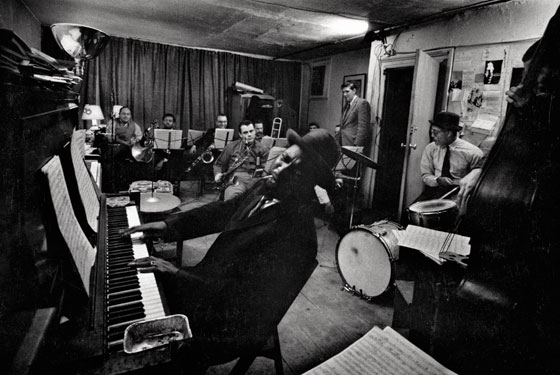
Anthony Dean-Harris wrote a
provocative post for Nextbop this week in which he poses a question: Is the jazz audience in America shrinking because potential new listeners are "turned off" by the arduous task of digesting the "imposing" history of the music? You should go read the full post, I'll wait.
--
I enjoyed seeing that someone else thinks about these things, and Anthony makes some good points here. More than almost any other kind of music, jazz is
defined by its past, so much so that you may not even think of it as a living music if you didn't know any better.
However, I think Anthony veers off track when he writes, "They should hear the music of jazz’s past, not because it’s educational but because it’s entertaining in its own right." I do not disagree with his assertion, but rather I think that if we jazz enthusiasts are to help evangelize jazz, we will have to resist the temptation to recommend a laundry list of historical recordings as a means of introducing new listeners to the music (I'm not accusing Anthony of this, but merely trying to say we all should just back off a little bit). To draw on Anthony's analogy to rock music, I don't feel the need to couple a White Stripes recommendation with a Led Zeppelin album for historical perspective. I think the White Stripes catalog is good enough by itself without imploring someone to listen to the band's antecedents. Besides, anyone who wants to know more about the White Stripes' influences can easily get to Led Zeppelin on their own, and I think the analogy holds true if you were to replace the White Stripes and Led Zeppelin with Jason Moran and Jaki Byard.
The idea that history is an added burden to the task of expanding jazz listenership should not be discounted, not because jazz neophytes might be turned off by learning about the music's history, but because neophytes might already be buying into a specific master narrative of jazz that automatically dismisses the music as a museum piece. To put it another way, people do not ignore jazz because they don't want to learn about Duke Ellington or Miles Davis, they ignore jazz because they associate the music with dead people who are less likely to be relevant to them. This is one reason why A Blog Supreme's
Jazz Now project was championed by so many other bloggers. At heart, we all understand that current jazz is thriving artistically, and that new listeners could easily love the music if we would just recommend something recorded by living musicians whose work contemporary world.
BONUS MATERIAL: Anthony's post reminded me of a thread that run's through Art Taylor's wonderful collection of interviews,
Notes and Tones
. Taylor asks each of his interviewees, including Miles Davis, Max Roach, Don Cherry, and Thelonious Monk, what they think about the word "jazz," eliciting all manners of discursive thoughts on the word and its not insignificant impact on the lives of individual musicians. If you haven't read this, it is worth an afternoon of your time, you can find a copy in the stacks of any college library with a decent music department, and some public libraries (or you could just shell out the ten bucks for your own copy).
 If you're snowed in like I am, take a look at David Hadju's New York Times essay on Fred Hersch's comeback. It is a detailed chronicle of Hersch's comeback from near death due to HIV complications, as well as an exploration of his style. It is worth your Sunday morning. However, I must quibble with his somewhat reductive take on the music of Hersch, Brad Mehldau, Vijay Iyer, and others. As Hadju describes it
If you're snowed in like I am, take a look at David Hadju's New York Times essay on Fred Hersch's comeback. It is a detailed chronicle of Hersch's comeback from near death due to HIV complications, as well as an exploration of his style. It is worth your Sunday morning. However, I must quibble with his somewhat reductive take on the music of Hersch, Brad Mehldau, Vijay Iyer, and others. As Hadju describes it 








